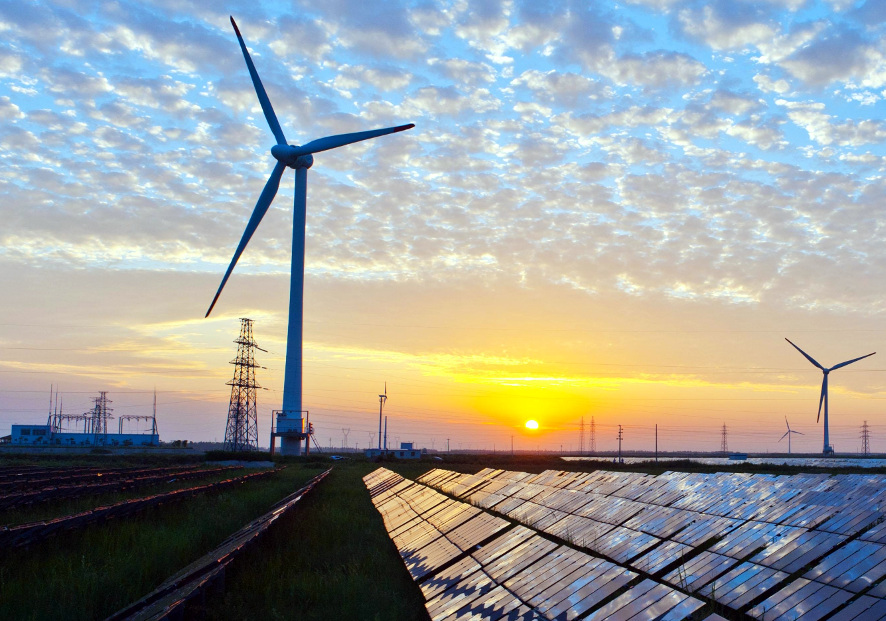Blackstone is the world’s leading private equity investment firm with assets under management (AuM) of US$571 billion, including over US$13 billion invested in India across real estate and private equity. It claims to have a focus on sustainability at the core of its global business.
In light of the significant recent commitments of the world’s biggest equity manager BlackRock and the world’s biggest bank JP Morgan Chase to both better align with the Paris Agreement and invest in zero-emissions renewable energy systems of the future, wouldn’t it be grand for Blackstone’s founder and CEO Steve Schwarzman to invest in Indian renewable energy and/or grid infrastructure?
Green finance
For a more sustainable economic growth platform, it is critical that India improves its energy security by reducing its reliance on ever-larger fossil fuel imports. Prime Minister Narendra Modi’s vision of 450 GW of renewable energy by 2030 requires a total generation and grid investment of US$500-700 billion to build out a zero-emissions, domestic, low-cost and sustainable electricity system. This, in turn, would permanently improve India’s air pollution and put the country on a world leading path to a progressive decarbonisation.
The world’s largest investment bank, Goldman Sachs, is already the biggest foreign investor in Indian renewable energy, through the country’s leading renewable developer Renew Power.
It would be a huge endorsement for India’s globally important energy transformation were Blackstone to announce it would bring its global firepower to helping accelerate investment in this sustainable, profitable domestic energy solution for India. It would indeed be commendable if Blackstone also continued avoiding any fossil fuel investments in this country.
While portfolio investments like warehousing and logistics tend to have a large carbon footprint, they also bring the possibility to leverage behind-the-meter distributed rooftop solar, electric vehicle and energy efficiency solutions, which Blackstone could develop as a concurrent, aligned investment strategy.
Blackstone in India
Blackstone is one of the world’s leading private equity investment firms. Its stated objective reads “we seek to create positive economic impact and long-term value for our investors, the companies in which we invest, and the communities in which we live and work.” This includes a core objective of being more environmentally sustainable.
Blackstone’s AuM of US$571 billion as in December 2019 (up 21% year-on-year) are split between property, private equity and credit.
Blackstone has been active in India since 2006 and has committed over US$13 billion of investments in India split equally between private equity and real estate, making India Blackstone’s largest market in Asia.
Back in 2018 Blackstone claimed it had recorded an annualized internal rate of return of some 30% on its India private equity investments since 2011, the highest among its markets worldwide.
Last year saw Blackstone acquire Aadhar Housing Finance Limited with AuM of Rs 100 billion (US$1.4 billion) in February 2019 for US$500 million and then Aakash Educational Services Limited in October 2019, a business teaching more than 250,000 students across 130 cities in India, whilst also investing US$1.4 billion in Indian commercial property, including acquiring the outstanding minority stake in Indiabulls Real Estate Ltd’s commercial real estate portfolio.
In September 2016, Blackstone sealed its largest purchase in India till then by investing US$870m to buy control of Mphasis Ltd., a Bengaluru-based technology services provider, from Hewlett Packard Enterprise Co.
In January this year Blackstone said that it sees a strong possibility that fears of an economic crisis in India are allayed, suggesting it sees likely that “India recovers from decelerating growth. The Modi government continues business-friendly growth reforms, the economy grows at 6% and the market rises 20%.”
Hopefully the headwinds unleashed by the coronavirus will abate soon and would not undermine this projection too materially.
The opportunity
While India accounts for a low per capita carbon dioxide emission, given the sheer size of its population, it stacks up as the third most polluting country in the world. With an assured growth pipeline over the coming decades driven by a large aspirational, well-educated middle class population, the Indian economy deserves a quick course correction — a pathway founded on sustainable, domestic renewable energy.
The Indian government’s long-term objective and commitment to transform its power sector with 450 GW of total renewable energy capacity by 2030 provides a US$500-700 billion investment opportunity for global investors.
Blackstone would be aware of what its global peers are doing in India. Actis and Brookfield, two top investors in global renewables infrastructure, recently competed to acquire 600 MW of solar capacity owned by one of India’s top solar developer, ACME solar. February 2020 saw Actis outbid Brookfield to acquire this capacity for Rs 3000 crore (US$ 400 million).
Blackstone’s investments till date have been largely transactional. To be truly impactful it needs to become a transformational player. From being its largest market in Asia and the most profitable globally, Blackstone ought to strive to showcase India as its most ESG [environmental, social and governance] driven corpus—highlighting indeed that sustainability is at the core of its global business!
Tim Buckley, IEEFA’s Director of Energy Finance Studies, Australia/South Asia, has 25 years of financial markets experience, specializing in equity valuation, including as a top-rated analyst and as co-founder and managing director of Arkx Investment Management.
A former CEO, Praveen Gupta has spent nearly four decades with the insurance industry, having worked in India, UK, Hong Kong and Thailand. Praveen writes and speaks on diverse subjects, and is particularly passionate about Climate Change.
The views and opinions expressed in this article are the author’s own, and do not necessarily reflect those held by pv magazine.
This content is protected by copyright and may not be reused. If you want to cooperate with us and would like to reuse some of our content, please contact: editors@pv-magazine.com.








1 comment
By submitting this form you agree to pv magazine using your data for the purposes of publishing your comment.
Your personal data will only be disclosed or otherwise transmitted to third parties for the purposes of spam filtering or if this is necessary for technical maintenance of the website. Any other transfer to third parties will not take place unless this is justified on the basis of applicable data protection regulations or if pv magazine is legally obliged to do so.
You may revoke this consent at any time with effect for the future, in which case your personal data will be deleted immediately. Otherwise, your data will be deleted if pv magazine has processed your request or the purpose of data storage is fulfilled.
Further information on data privacy can be found in our Data Protection Policy.